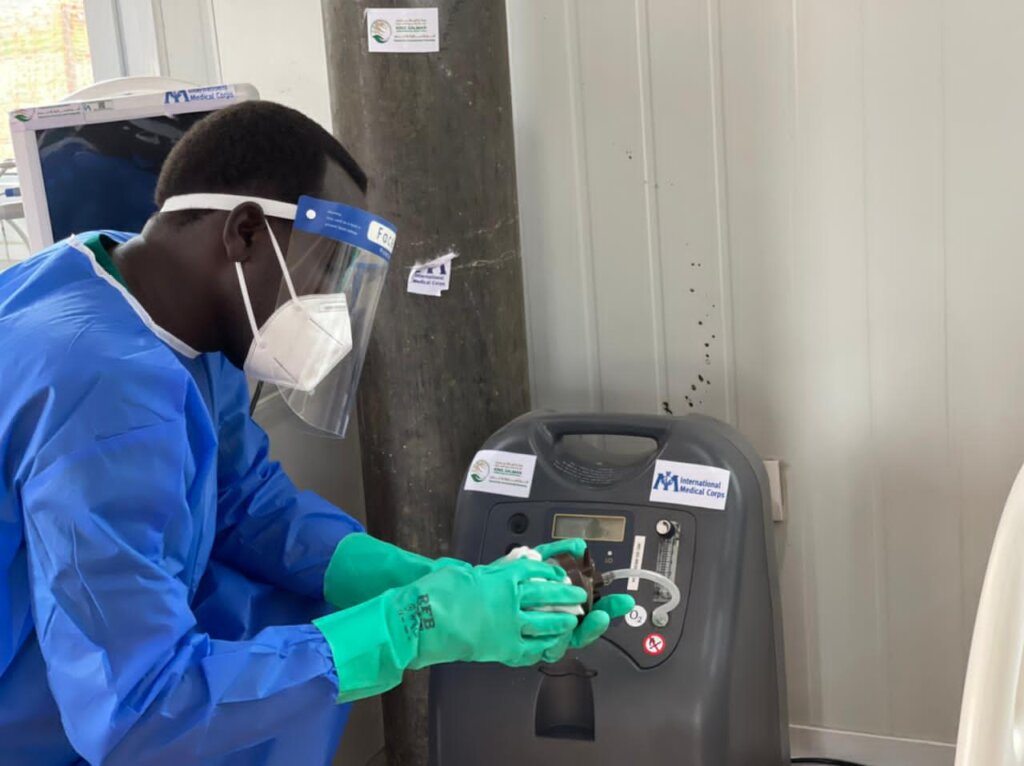By Christin Runkle | Senior Specialist, Internal Communications
In many countries where we work, the COVID-19 pandemic has overburdened healthcare systems that were already ill-equipped to care for extremely sick people. The health system in South Sudan is one such example. However, our work to establish an infectious disease unit (IDU)—which became home to South Sudan’s first and only Level 1 intensive care unit (ICU)—has helped the country better prepare itself to take care of its sickest patients.
The World Health Organization and South Sudan’s Ministry of Health built the Dr. John Garang Infectious Disease Unit in Juba in late 2018, and in February 2019, handed over operation of the IDU to International Medical Corps.
In early 2020, the country was suddenly faced with a new challenge: COVID-19. That spring, we received the funding necessary to increase the level of care that the IDU could provide, upgrading from an isolation unit to an infectious disease treatment facility. Still, we were able only to provide minimal support to patients: monitoring them, and providing fluids, basic treatments and medications. We did the best we could, bringing in the additional resources, drugs and equipment that were needed until November 2020, when the Ministry of Health requested that our Emergency Medical Team (EMT) increase the level of care at the IDU even further.
The EMT sent five critical-care specialists to the IDU: a team lead, an ICU nurse, an ICU physician with a background in anesthesia and critical care medicine, an ICU physician trained in point-of-care diagnosis, and a biomedical engineer who could review the unit’s equipment.
“The EMT started from scratch, doing an assessment of the critical-care capacity in South Sudan,” explains Dr. Abdou, International Medical Corps’ Medical Director in South Sudan. The report found low capabilities for critical care in South Sudan and made a number of recommendations. “We started implementing those recommendations to increase capacity in the IDU to a Level 1 intensive care unit,” he says.
Today, the eight-bed Level 1 ICU enables critical-care workers to provide additional medical support to patients who are very ill. It has been equipped with sophisticated, real-time monitoring equipment, ventilators and supplementary oxygen devices. Health staff can use a new point-of-care laboratory to check blood hemoglobin or protein levels in urine, or to test people for diseases such as HIV or malaria.
“We now have a Level 1 ICU—the first ever in South Sudan that is accessible to the general public—where everyone can go, and which everyone can rely on,” says Dr. Abdou. “It has made a very big difference, and it has brought hope that South Sudan can start thinking about how to expand critical-care capacity. That is a big impact for the future of the health system in this country—and that was brought about by the IDU and 100% supported by International Medical Corps.”
With support from the GlobalGiving community and other donors, International Medical Corps continues to bring hope and healing to South Sudan.
By Caitlin Bartkus | Associate Specialist, Resource Development
By Clara Long and Ryan Stafford | Communications Officers
Project reports on GlobalGiving are posted directly to globalgiving.org by Project Leaders as they are completed, generally every 3-4 months. To protect the integrity of these documents, GlobalGiving does not alter them; therefore you may find some language or formatting issues.
If you donate to this project or have donated to this project, you can receive an email when this project posts a report. You can also subscribe for reports without donating.
Support this important cause by creating a personalized fundraising page.
Start a Fundraiser